News & Events
June 13, 2025
Champions of Mental Health 2024 Recipients
Keywords: 2024, Champions, Mental Health, Public Safety Personnel (PSP)
In 2021, CIPSRT put out a call for its inaugural Champions of Mental Health awards program. In response, we received over 200 nominations from public safety sectors across Canada. We have been overwhelmed by the eagerness of people to hold up their peers as positive examples of those working toward actively improving the mental health of people in their organizations.
Now in our third year celebrating Champions of Mental Health we were once again overwhelmed by the positive response to our call for nominations. The selection committee, which included previous Champions, members of our Public Safety Steering Committee, and CIPSRT staff, had the privilege of reading nominations that detailed the stories of passionate and committed Public Safety Personnel (PSP) from across Canada who truly “walk the talk” when it comes to supporting their colleagues’ mental health and wellbeing.
PSP were nominated from diverse sectors and provinces across Canada. It was difficult to narrow it down to the 20 recipients celebrated here, with so many deserving nominees.
We congratulate each of our 2024 Champions for improving mental health in their organizations. Each of the recipients has inspired us at CIPSRT. We believe their stories will also inspire future mental health champions. Please read on to learn more about the great work they are doing in their organizations.
Nomination Criteria
To be considered a Champion, a nominee will be evaluated on the following criteria:
- Commitment to evidence-based/evidence-informed practice
- Impact on the mental health of their organization and community (i.e. changes or improvements they have been able to make)
- Number of people positively affected by their mental health efforts
- Willingness to speak about their mental health journey
- Creation of mental health and wellbeing resources and/or programming
- Commitment to decreasing mental health stigma
- Activities as a peer supporter or member of a reintegration team
Mental Health Champions are passionate and genuine when it comes to supporting the mental health and wellbeing of everyone in the organization.
Anyone within a public safety organization, sworn or civilian, may be nominated for recognition by CIPSRT as a Champion of Mental Health. To be considered, a nominee must work for one of CIPSRT’s recognized Canadian public safety sectors:
- Border Services
- Corrections
- Public Safety Communicators (911, dispatch)
- Firefighters (including volunteer)
- Emergency Managers
- Operational Intelligence personnel
- Police
- Paramedics
- Search and Rescue personnel (including volunteer)

Michelle Andrews
Michelle began her career in 1998 as a correctional officer at the Millbrook Correctional Centre, later transferring to the Central East Correctional Centre where she worked with male, female, and special needs offenders. She became a correctional officer peer mentor to new recruits and then transitioned into the co-chair role for the correctional centre’s Peer Mentorship Program. She also became a peer member of the Critical Incident Stress Management (CISM) Program.
In 2021 Michelle was hired as a regional lead for the Corrections Peer Support Program, which replaced CISM. She has played an instrumental role in the program’s uptake and succession, as she brings a front-line lens to the stressors faced by correctional staff.
Michelle prides herself on educating and bringing awareness of mental health supports and resources, including the benefits of a peer support model, to all correctional staff. Becoming a safeTALK Suicide Awareness Trainer and Stress Resilience Training Systems Trainer allowed her to further educate and break down stigma around reaching out for help and struggling in silence.
“In corrections, the pressure to bottle up trauma and just keep going has caused many to develop operational stress injuries. It’s time to make it normal to talk about our feelings and stressors, without being seen as weak,” she said.

Niya Bajaj
Niya Bajaj delivers wellness-centered leadership training that supports organizational culture change for improved employee well-being. She has coached more than 500 leaders, including those in working in Ontario’s correctional services, those working in the province’s youth justice system and leaders in the Ontario Provincial Police. Her coaching has focused on delivering the Ontario Public Service’s Leadership Network Mindfulness for Leaders program.
“I have lived with a mental health condition for most of my life and have seen the significant impact it has on my physical, mental, occupational, social and financial wellbeing.”
Niya says she is fortunate to be able to lean on ancestral wellbeing practices such as yoga and storytelling, for her ongoing recovery.
“Over the course of my career, I’ve seen the effect that leaders can have on their staff, especially when they are burnt out. This has fueled my determination to support leaders in taking care of themselves, so they can better support their public service teams to deliver thoughtful, excellent quality service,” she said.
Niya believes that her greatest contribution to improved mental health in the Ontario Public Service has been the creation, delivery, evaluation, and improvement of the Mindfulness for Leaders program. The program provides leaders with daily mindfulness practices that improve their capacity to manage stress, support emotional regulation, enhance resilience, improve focus, think creatively and collaborate.
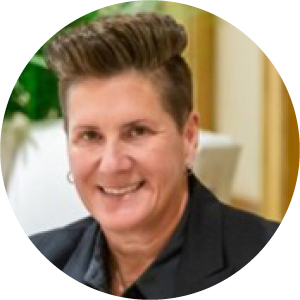
Monique Bergeron
A dedicated community partner with a deep passion for supporting vulnerable populations, Monique Bergeron is now in her 21st year as a constable with the Windsor Police Service. She brings both experience and heart to everything she does. Over the years, she’s found the most fulfillment in roles where she could connect directly with the community – whether through the Patrol Response Unit, the High School Resource Unit, or the Police Outreach Unit.
Beyond her work in law enforcement Monique shares her knowledge as a part-time professor at St. Clair College. She teaches Mental Health and Addiction Awareness for First Responders, a course that reflects her commitment to breaking down stigma and building understanding within the emergency services field.
Certified by the Mental Health Commission of Canada, Monique facilitates three Mental Health First Aid courses – Basic, Youth, and Police – and she approaches each session with compassion, insight, and a desire to empower others.
Monique also volunteers as an instructor with Boots on the Ground, helping prepare volunteers to support emergency responders during serious and often confidential calls, and she’s a board member with both Leone Residence and Mental Health Connections.
Among her many accolades, Monique is especially proud of receiving the Champion of Excellence Award from the Greater Essex County District School Board – an honor that reflects her positive impact on students and the broader community.
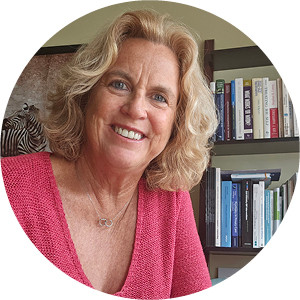
Hélène Brouillet
Hélène Brouillet has been a psychologist with Urgences-santé for over four years. She was previously involved in the development and implementation of innovative mental health programs, as coordinator of a crisis and suicide prevention center, head of the psychosocial intervention component in civil security, and volunteer trainer on psychological first aid in Port-au-Prince, Haiti.
“I have over 36 years of experience in the healthcare field, including several years in crisis and emergency intervention. Twenty-two years ago, I had to seek help for post-traumatic stress disorder (PTSD) following a workplace assault. At the time, there were few specialized resources, and it was not common to talk openly about mental health issues in the workplace. I recognize the importance of having access to qualified resources, having the support of our peers and loved ones, and promoting destigmatization,” she said.
Hélène views her greatest contribution as working with community partners on creating ways to identify employees who may be struggling after a traumatic event. This work also supports individuals when specialized follow-up is required, and it assists them when they return to work.
“Helping those who help others remains my main passion!”

Marie-Claude Duguay
A mental health nurse with Correctional Service Canada, Marie-Claude Duguay spent close to ten years working in an acute institutional setting. She now provides care in the community. She has also been a dedicated member of the Crisis Intervention Stress Management teams since 2015, supporting her peers through critical incidents, and promoting mental wellness within public safety.
“My passion for mental health began during my nursing studies and has continued to grow ever since. Working in corrections, I quickly realized the unique challenges of the environment and felt driven to support not only the clients in our care, but also my peers who face those challenges every day,” she said.
Marie-Claude believes her greatest contribution is her promotion of mental health awareness, by facilitating workshops, sharing resources, and displaying positive messaging to encourage open dialogue.
“I offer a supportive, listening ear to peers in need, and I strive to create an inclusive environment where mental well-being is prioritized,” she said.
Through consistent efforts, she works to help foster a more compassionate and mentally healthy workplace culture.

Laura Duncan
Laura Duncan, a captain with the Winnipeg Fire Paramedic Service, has been a firefighter for 27 years. She has spent five years as a peer support team coordinator and advocates for her peers through her role on the mental health committee with the United Firefighters of Winnipeg.
Laura also has experience teaching the Road to Mental Readiness (R2MR) and Resilient Minds programs and has assisted in creating curriculum for corrections. Mental health is important to Laura because she has seen the effect emergency services work has had on her colleagues.
“Working in an organization for years where we had no appropriate resources and where stigma was preventing individuals from reaching out for help, I decided to get involved with the peer support team. I became an advocate for breaking down stigma and fighting for better resources,” she said.
Laura worked with retired Winnipeg police psychologist, Bill Davis, on research into how the brain processes traumatic information. Through this work they were able to create a response method for members.
“Creating an appropriate and effective response for our members opened opportunities for coworkers to connect, share and support each other.”
Laura’s team also established a behavioural health unit so members can access appropriate resources in a timely manner.
According to Laura, her greatest contribution is the work she has done, advocating for education, creating content based on the lived experience of members, and lobbying for funding of the behavioural health unit.
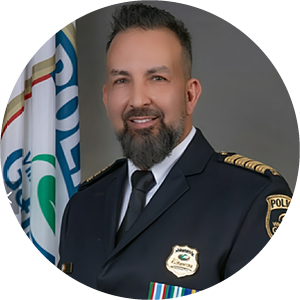
Sylvain Fournier
Chief Inspector Sylvain Fournier established a Mental Health Steering Committee within the Service de police de la Ville de Gatineau (SPVG) in 2021, aiming to include all employees of the organization. Composed of 13 members representing all divisions, the committee focused on promoting well-being and providing tangible support to employees.
“This is an essential collective effort, where fostering open dialogue about mental health is a key lever in combating stigma,” he said.
Over the course of his 30-year career, Chief Inspector Fournier has faced extremely challenging moments, including the loss of colleagues and friends to suicide. Deeply committed to supporting personnel and their families, he has consistently worked to provide respectful and compassionate guidance throughout the grieving process. He continues to emphasize the importance of attentive listening and open dialogue on psychological health, both elements he considers essential to well-being.
Chief Inspector Fournier considers the SPVG’s Mental Health Steering Committee to be one of his greatest contributions. The committee is currently overseeing the implementation of initiatives aimed at promoting the psychological well-being of both police officers and civilian employees. Key measures include the establishment of a peer support program involving over 75 field employees, the development of a structured return-to-work program, the hiring of an in-house psychologist and a post-critical incident defusing program to ensure appropriate support following high-impact events.

Tom Gibson
Tom Gibson worked as a youth services officer for more than 30 years. He was an active member of the Ministry of Children Community and Social Services’ Youth Justice Health and Safety Committee, and the division’s Youth Justice Occupational Stress Injuries Committee.
“Working in youth justice is physically and emotionally challenging. It was clear early in my career that our physical safety was much more of a priority than our mental health. Stigma was unfortunately thriving. This motivated me to become active on our operational stress injury committee, promoting balance in addressing physical and mental health,” he said.
Tom believes his greatest contribution was an agreement he and the Youth Justice Occupational Stress Injuries Committee negotiated with the employer to develop a worker-led peer support program.
He is also very proud of the wellness resource program available for all youth justice facilities and probation offices, which was developed and implemented while he was a member and co-chair of the Youth Justice Occupational Stress Injuries Committee.
Tom worked tirelessly to ensure that youth justice workers are recognized as public safety personnel. In 2023 the Ministry of Children Community and Social Services had its first ever Youth Justice Recognition Week.

Matt Johnston
As a full-time firefighter and mental health professional, Matt Johnston is passionate about bridging the gap between healthcare providers and first responders. His goal is to reduce the impact of operational stress injuries on those serving on the front lines. Mental health is especially important to Matt because he has lost numerous colleagues to suicide.
“With my training in mental health, I see how much better we could be doing to support each other. I believe public safety organizations have the power to change how they care for their people – especially those who are struggling,” Matt said.
He believes that the right approach can save lives and build resilience across teams. Matt is most proud of his contributions to the Occupational Awareness Training Program for First Responders and Healthcare Professionals. Since 2017 he’s trained over 500 healthcare providers on how to improve treatment outcomes when working with first responders.
“Today, more than 10,000 firefighters are receiving our mental health training, and I’m excited to expand this work internationally in the years ahead,” he said.

Sherry LaFaver
Sherry LaFave is a social worker who has worked within the Prince Albert Police Service and Royal Canadian Mounted Police (RCMP) for almost 30 years. She has also worked as a victim services coordinator with the member employee assistant program, and most recently as a mental wellness strategist. Sherry is passionate about mental health.
“For me it’s not a matter of if you will need mental health support, but when. First responders work under extremely difficult situations, and it is important to recognize that it is a normal part of the job to look after one’s health,” she said.
Sherry’s husband was a first responder for years, so in addition to her experience in the social work field she has spent almost 30 years in the policing environment. She also believes that being able to work alongside members of both the Prince Albert Police Service and the RCMP at scenes has allowed her to be involved at a very personal level.
According to Sherry, her greatest contribution has been her part in a two-person team working on the Mental Health Wellness Strategy at the Prince Albert Police Service.
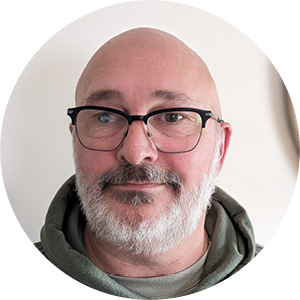
Bruce Lalime
Bruce Lalime is a Superintendent / Shift Supervisor for the Canada Border Services Agency (CBSA) at the National Targeting Centre with the Road, Rail and Air Cargo Targeting Unit.
As a mental health survivor, Bruce has experienced four major depressions and received two diagnoses of post-traumatic stress disorder (PTSD). He has also lived with suicidal thoughts since he was eight years old. Bruce believes passionately in the importance of mental health.
“It is essential to talk about mental health and to remove the stigma surrounding it,” he said.
Bruce believes his greatest contribution is the peer support work he started in 2021. During his last episode of 2021, he started a peer support group on Facebook, exclusively for CBSA employees. Bruce has, since the spring of 2024, been giving talks about mental health and sharing his story through the peer support group.
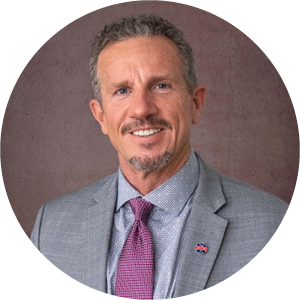
Warren Leeder
As the Health and Wellness Director for the Ambulance Paramedics of BC, Warren Leeder is active in his organization’s Critical Incident Stress Management (CISM) program. Warren has a diploma in disability management and has recently become a mental health first aid facilitator through the Mental Health Commission of Canada.
“My passion for mental health was sparked after a colleague of mine recognized that I might be struggling with some recent difficult calls. Our CISM team was activated. I felt very supported. It is what put me on the path of a being a mental health champion,” he said.
Warren believes that with 30% of members struggling with operational stress injuries, mental health support is critically important for paramedics and dispatchers.
“We deal with very difficult events on a daily basis, work long hours, and make high-stress decisions. Addressing mental health in our work is crucial. Promoting mental health awareness and support can reduce the stigma associated with seeking help, so we continue to encourage our members to access the resources they need,” he said.
Warren believes his greatest contribution, as a certified mental health first aid facilitator, is helping to bring mental health first aid to his organization’s membership.
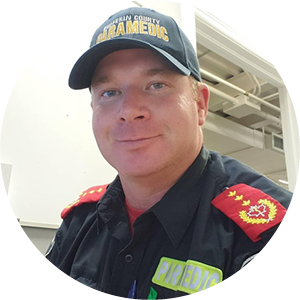
Brian MacIntyre
Brian MacIntyre became a volunteer firefighter in his hometown when he was 18 years old and then began working as a paramedic at age19. He resigned from the fire service as a lieutenant after 13 years of service and continues to work as an Advanced Care Paramedic / Supervisor for Duffer County Paramedic service.
“I have worked to be a mental health advocate and support for all responders throughout my career and was an inaugural member of the Dufferin County Peer Support program when we formalized it in 2017,” he said.
According to Brian, being a paramedic has been a rewarding career choice.
“I wouldn’t want to do anything else. My hope is that with the right supports, there will be less impact on what a paramedic carries with them from the job,” he said.
Brian is most proud of the time he spends annually with new hires, when he instructs the Road to Mental Readiness (R2MR) program.
“I get to share my experiences with new paramedics that are just starting out in the profession. I hope by normalizing the impact some calls have had on me as paramedic, may help them at some point over their careers,” he said.

Julie McCarthy
A health system navigator in the community paramedic program with the Ontario Leeds Grenville Paramedic Service, Julie McCarthy is also a former primary care paramedic. She retired as a paramedic following a 20-year career on the road. Julie works in a volunteer position as the Peer Support Alternate Coordinator and a mental health advocate for Leeds Grenville Paramedic Service.
“Mental health has always been of interest to me both personally and professionally. I care deeply about advocating to break down barriers, open discussions and reduce stigma. I am blessed to be surrounded by many team members whose tireless volunteer contributions make our workplace better,” she said.
Julie believes her greatest contribution is a peer support group she was involved in starting. The group has enabled her team and staff members to receive education and training about work life balance. She has also been involved in collaborating with the Wellness Coordinator around the provision of resources and the offering of monthly drop-in sessions for staff.
“There is still a lot of work to be done, but we have made great strides in the last three years,” she said.

Danielle McCormack
Currently a primary care paramedic, Danielle McCormack has a long history with EMS. She worked for a decade with Edmonton metro EMS, is presently working in central zone Alberta Health Service EMS, and is in the process of transitioning to an advanced care paramedic role. Danielle says mental health became a passion for her when she experienced post-traumatic stress disorder (PTSD). She has since gone through my own post trauma growth.
“The people who helped me heal inspired me to help my coworkers and to share my story with others on their own journeys. EMS shouldn’t have to mentally hurt us as much as it does, if we teach our members how to prevent PTSD and have strong support from our employers when injuries happen,” she said.
Currently Danielle’s zone doesn’t have a solid reintegration team, so she is hoping to assist in starting up a team in the central zone that will work with teams in the larger metro centres. She is also working with the peer support team in Alberta Health Service EMS and spends time volunteering with OSICAN peer support groups.
“I am always willing to talk about mental health and how we can learn more about the way stress affects us!”

Joel McNair
Joel McNair is a firefighter with the Saskatoon Fire Department. He struggled with post-traumatic stress disorder (PTSD) for two years between 2015 and 2017, eventually entering the Sunshine Coast Health Centre for 57 days of in-patient treatment for PTSD and alcohol use disorder.
Joel is currently on the City of Saskatoon’s EFAP board, and co-chairs the First Responder Mental Health Committee for the Saskatchewan Worker’s Compensation Board. He is also working with the University of Saskatchewan’s Department of Psychiatry on a study at the Saskatoon Fire Department and is a member of the IAFF Local 80 peer support team.
“Having dealt with PTSD and returned to my previous occupation, I believe that first responder organizations can provide their staff with better resiliency skills to keep them healthy and effective in their roles. As a first responder, I also believe that we have members who can support each other in times of personal crisis,” he said.
Joel credits his greatest contribution as his willingness to be open and honest about his mental health challenges. He believes this has helped to reduce the stigma surrounding this issue at the Saskatoon Fire Department.
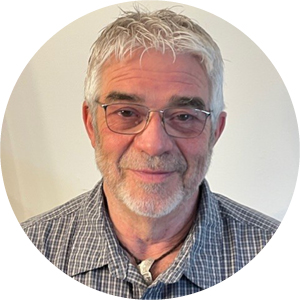
Joe Micucci
Joe Micucci has been a paramedic for more than 40 years. He has spent the last 20 years as Commander of Training. Joe participated in a Critical Incident Stress Management training program in 1988 and has been involved in peer support programs ever since.
“Throughout my years as a trainer I’ve seen many very skilled paramedics struggle with mental health issues due to a lack of training and to the stigma associated with talking about it. Many were forced to leave the profession because of this. I decided I wanted to help change this outcome.”
Joe feels his greatest contributions have been the creation of a large peer support team within the service and offering mental health training twice yearly. He believes this work has helped to reduce the stigma surrounding this disease among his colleagues.

Bosede Oyelakin
A mental health professional with more than ten years of experience in the field, Bosede Christiana Oyelakin has worked as a mental health counsellor, addiction counsellor, a direct support professional and community educator. She also volunteers with organizations supporting women and children, and promotes mental health through advocacy, peer support, and community education.
Mental health is important to Bosede personally and professionally because she’s experienced her own challenges with postpartum depression, and she has witnessed how deeply mental health issues can affect everyday life.
“My passion grew from supporting individuals, especially women and children who have been through abuse, and emotional struggles, while also recognizing the significant gap in mental health awareness and the lack of access particularly for Black communities,” she said.
The gaps she has witnessed have encouraged her dedication to advocacy, education, and the creation of safe spaces where mental wellness is prioritized and de-stigmatized.
Bosede believes her biggest contribution is the mental health outreach and virtual counselling service she designed and piloted with a nonprofit organization. She currently volunteers for the organization, with the goal of expanding access to care for underserved communities.
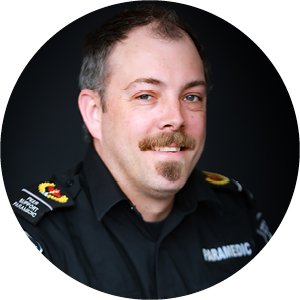
Cory Pepper
A primary care paramedic with Parry Sound Paramedic Services, Cory Pepper has also been a member of the peer support team for five years and co-lead with the team for one year.
Having dealt with varying degrees of anxiety throughout his life, Cory recognizes, understands and empathizes with the often-lifelong mental health struggles of other first responders.
“It is especially important in a high stress job such as paramedicine, for all of us to identify our mental health challenges and address them in a timely and healthy manner,” he said.
Cory thinks his greatest contribution was taking over as the co-lead of his peer support team when the previous lead had to take a sudden step away.
“Being able to maintain our team and press forward with new training, has allowed me to take a lot of workload and stressors off my plate. Being a calm and friendly presence at work allows me to be very approachable and makes my many coworkers able to open up to me about troubles or struggles they are going through,” he said.
According to Cory, his peer support training has enabled him to help his peers manage many challenges and facilitate further care.

Lyle Renaud
Lyle Renaud is a firefighter with the Niagara-on-the-Lake Fire Department, a member of the Ontario Hazardous Materials Responders Association (OHMRA), a certified Working Minds, Road to Mental Readiness (R2MR) instructor, and an educator with Hamilton Health Services’ Regional Base Hospital. He has worked as a frontline paramedic, operations supervisor and peer support member with Niagara EMS for the past 23 years.
“Throughout my career, I’ve faced challenging personal experiences, patient interactions, and the loss of colleagues to suicide, which contributed to a post-traumatic stress (PTSD) diagnosis. My mental health concerns were met with the pervasive workplace attitude, that competent paramedics suppressed their emotions, and that difficult calls were an expected ‘part of the job’,” he said.
As he recovered, he focused on developing resilience in paramedic students, implementing mental health support practices, and encouraging a more supportive culture for first responders.
Lyle is committed to teaching healthy coping strategies to veterans and first responders who have experienced operational stress injuries. He travels across Ontario instructing various mental health programs for veterans, first responders, hospital staff and the general public. His focus is on fostering resilience in a new generation of paramedics, and on encouraging frank discussions about challenging situations, with a goal of tearing down prevailing mental health stigmas.